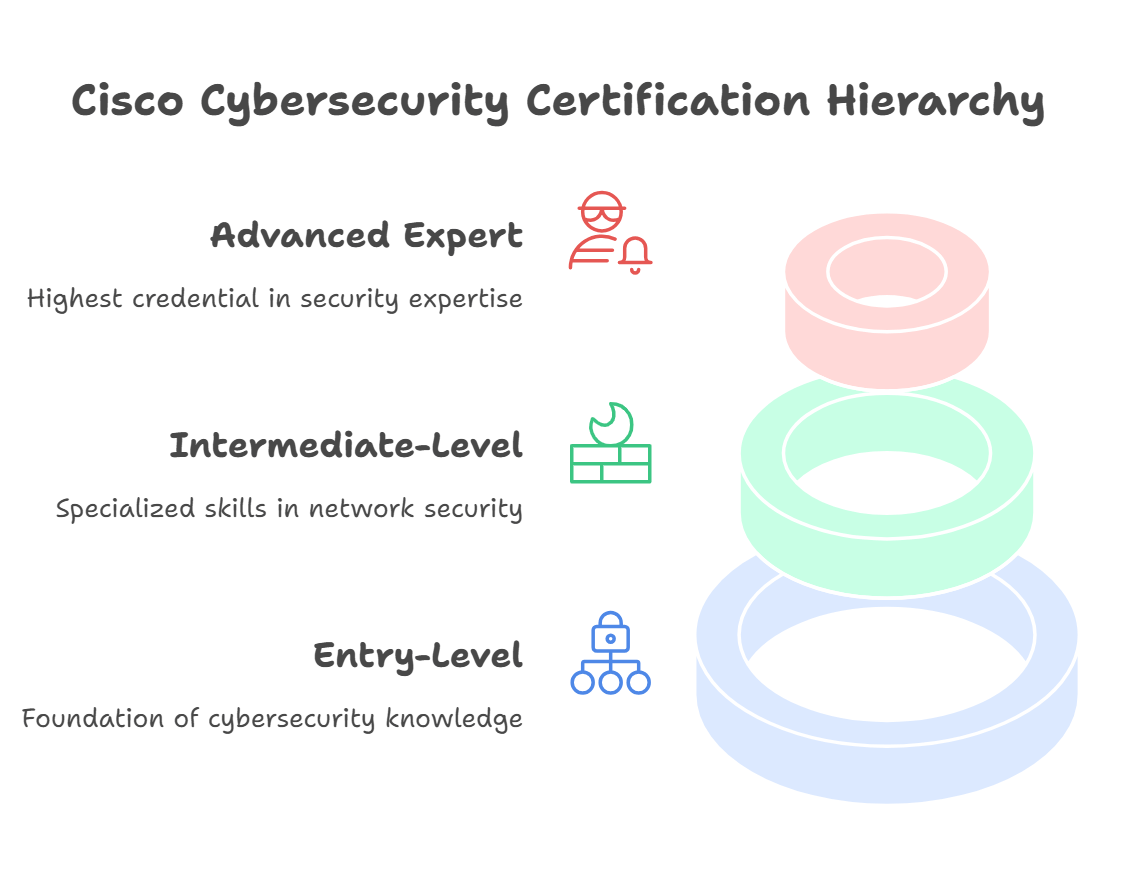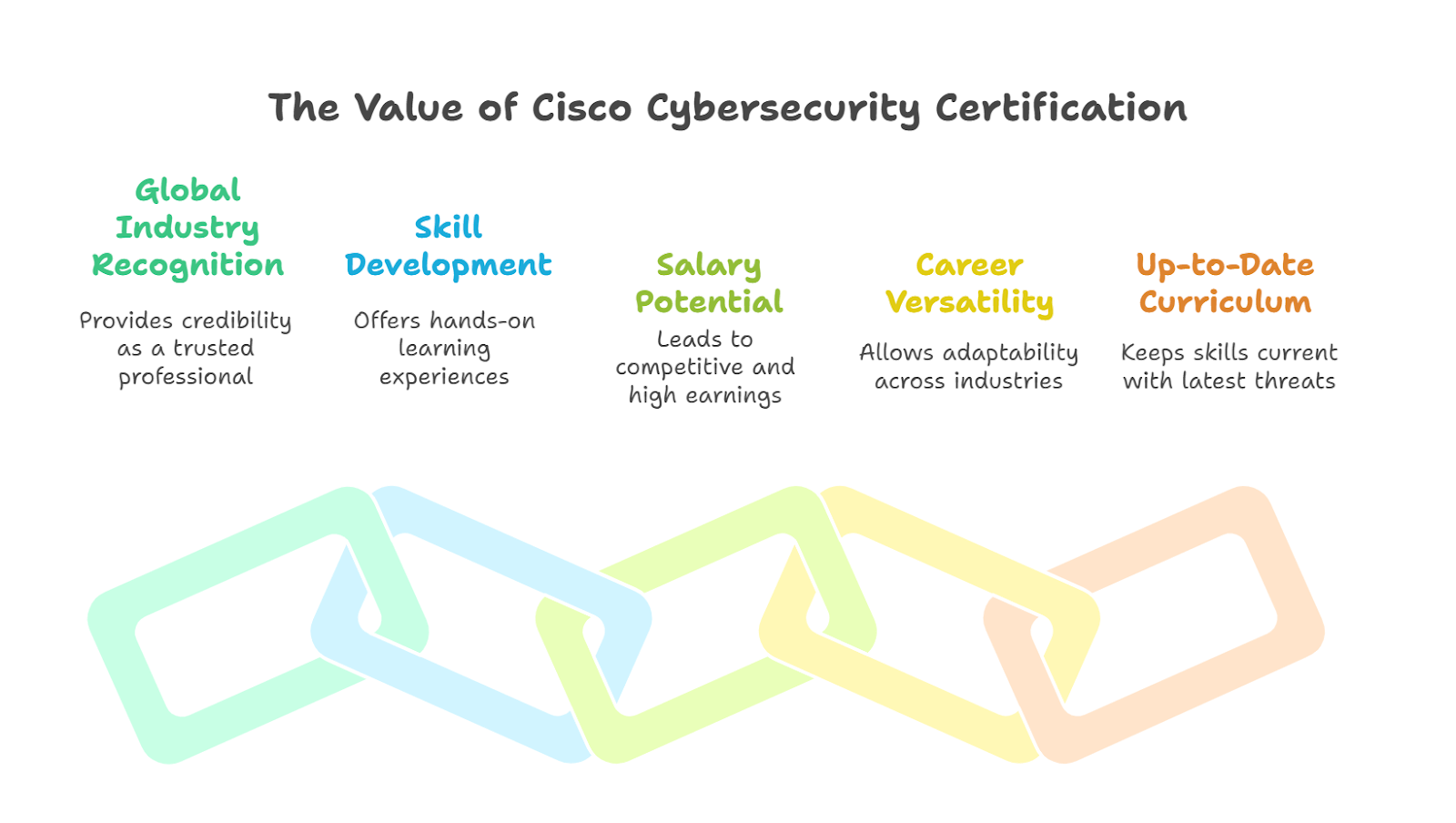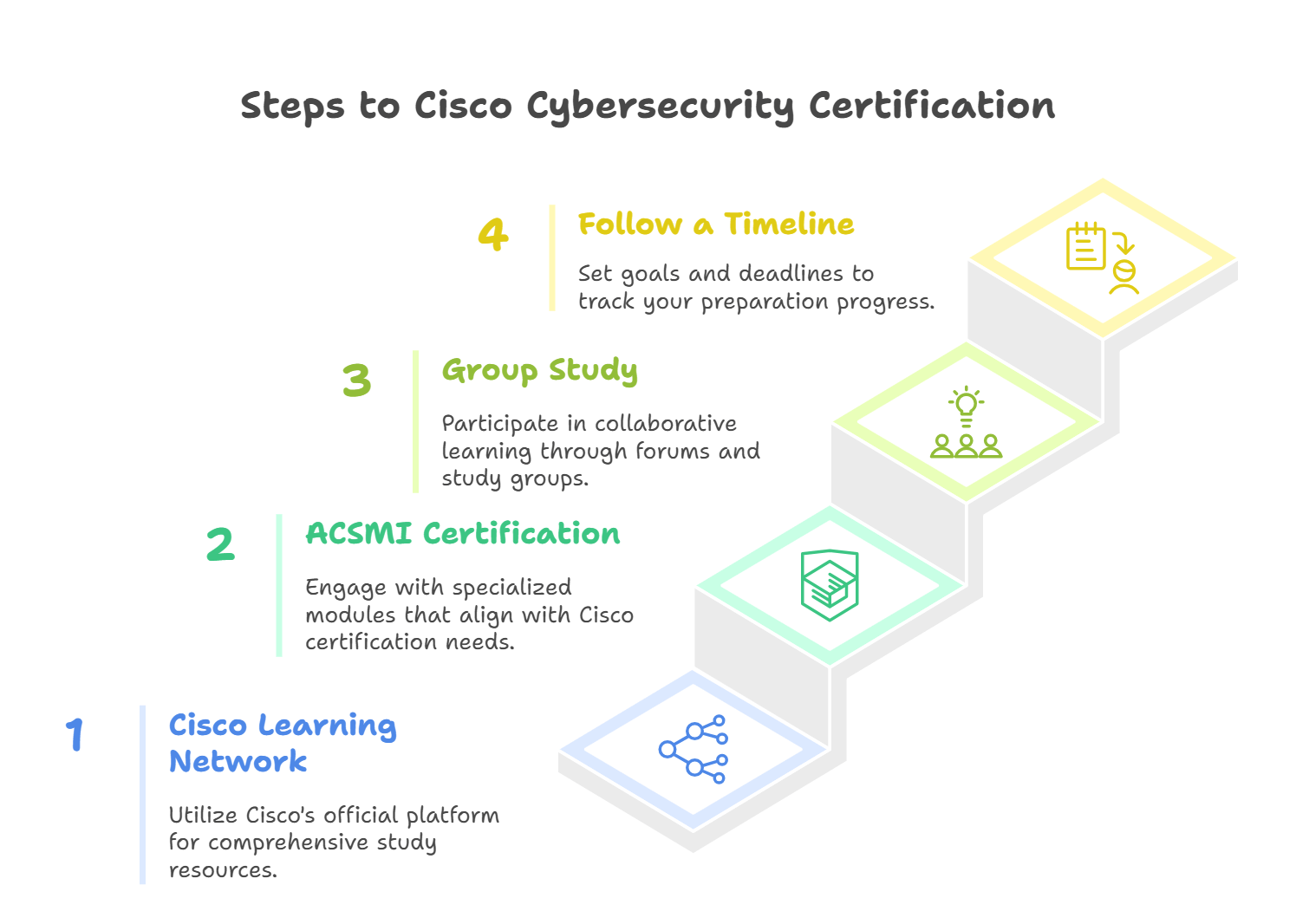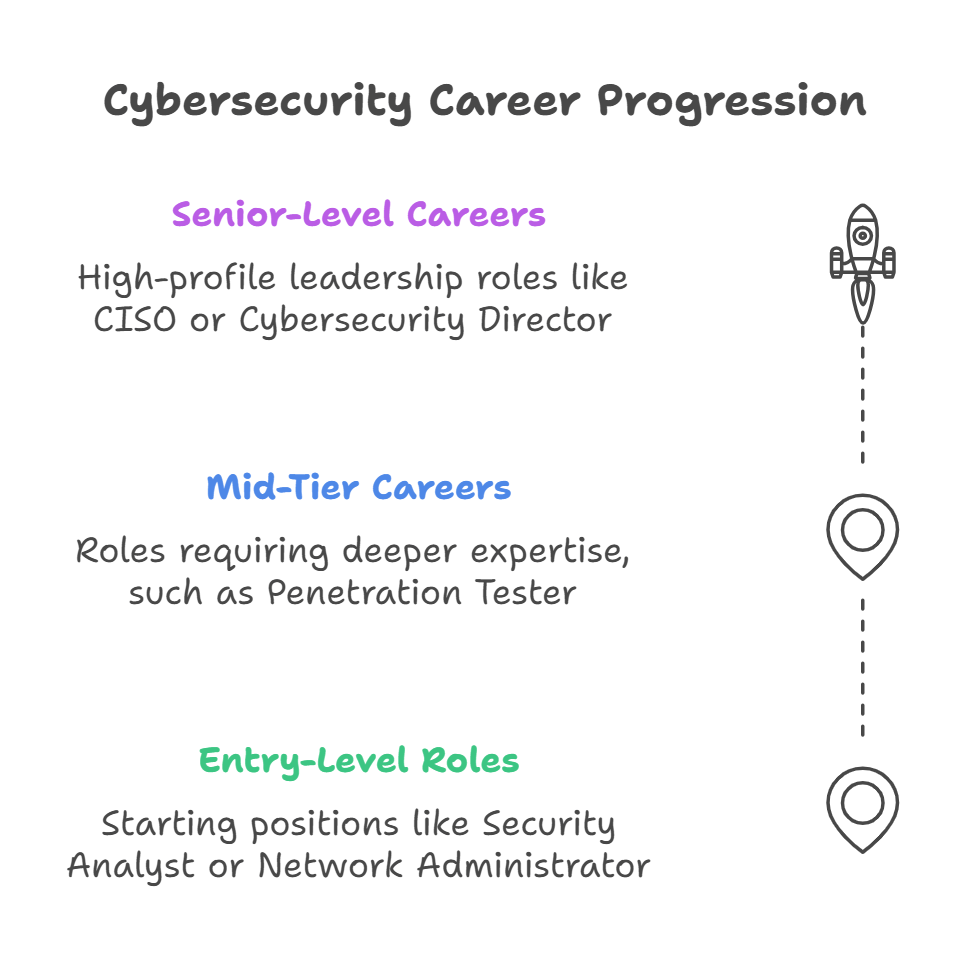Table of Contents
- What is Cybersecurity Certification Cisco?
- Levels of Cisco Cybersecurity Certifications
- Why Pursue Cybersecurity Certification Cisco?
- Challenges of Pursuing Cybersecurity Certification Cisco
- How to Prepare for Cybersecurity Certification Cisco
- Career Prospects After Cybersecurity Certification Cisco
- ACSMI and Cisco Certification Synergy
- Final Thoughts
- FAQs on Cybersecurity Certification Cisco
Cybersecurity is the backbone of today’s digital economy. With increasing reliance on digital platforms, businesses face a heightened risk of sophisticated cyber threats. Protecting data, securing systems, and preventing attacks require skilled professionals equipped with the right credentials. Among the industry’s most respected and recognized certifications are the Cybersecurity Certification Course Free and the Cybersecurity Certification Cisco. Known for its hands-on approach and global recognition, Cisco certifications provide a solid foundation for anyone looking to build or advance a career in cybersecurity.
In this guide, we’ll explore everything you need to know about Cisco cybersecurity certifications, from their value and career prospects to the challenges you may face and strategies for effective preparation. We’ll also discuss how combining Cisco certification with the ACSMI Certification platform, which offers 400+ training modules, can further enhance your expertise and success in the cybersecurity domain.
What is Cybersecurity Certification Cisco?
The Cybersecurity Certification Cisco validates your ability to manage, secure, and protect digital infrastructures. With its comprehensive training, Cisco certifications equip professionals with the skills to detect, respond to, and prevent cyber threats. These certifications are designed to guide individuals through all stages of their cybersecurity career, from foundational knowledge to advanced expert-level mastery.
Levels of Cisco Cybersecurity Certifications
Cisco cybersecurity certifications are categorized into three primary levels to accommodate professionals at various stages in their careers:

Entry-Level Certifications
Entry-level certifications provide the foundation of cybersecurity knowledge. For example, the Cisco Certified CyberOps Associate focuses on incident monitoring, security event analysis, and threat response.
Intermediate-Level Certifications
Intermediate-level certifications like Cisco Certified Network Security Specialist focus on more specialized skills, including penetration testing, endpoint security, and infrastructure hardening. These certifications are perfect for professionals seeking to advance their knowledge and take on more complex systems.
Advanced Expert Certifications
At the pinnacle of Cisco cybersecurity certifications lies the CCIE Security (Cisco Certified Internetwork Expert Security). This certification is one of the highest credentials in the field and focuses on end-to-end security policy creation, threat mitigation in real-time, and expertise in large-scale security architecture design.
Why Pursue Cybersecurity Certification Cisco?
Cisco certifications are globally recognized and provide immense value to professionals in cybersecurity. Cybersecurity Certification Philippines offers a pathway for individuals to gain expertise in securing networks and combating cyber threats. Here are a few reasons why pursuing a Cisco certification is a game-changer:

1. Global Industry Recognition
Cisco certifications are among the most respected credentials in the tech industry. They give you the credibility you need to work as a trusted cybersecurity professional capable of securing critical digital infrastructures.
2. Skill Development Through Hands-On Learning
Cisco’s certification process is centered around practical, hands-on labs. This approach bridges the gap between theory and real-world application, preparing you to handle live cyber threats effectively. Cisco’s scenario-based training, which simulates security breaches or threat mitigation tasks, ensures you’re well-prepared for real-world situations.
3. Excellent Salary Potential
Cybersecurity professionals holding Cisco certifications are highly sought after, and they command competitive salaries. For instance, entry-level positions like CyberOps Associate offer salaries in the range of $70,000-$90,000 annually, while experts with certifications like CCIE Security can earn upwards of $150,000 annually.
4. Career Versatility Across Industries
Every industry, from banking and government to healthcare and technology, needs cybersecurity professionals. Cisco certifications ensure you can seamlessly adapt to various sectors, providing you with the flexibility to work across industries while adhering to specific security policies.
5. Always Up-to-Date Curriculum
Cisco continually updates its curriculum to reflect the latest cybersecurity threats, ensuring that you remain on the cutting edge of cybersecurity practices, such as cloud security and AI-driven threats.
Challenges of Pursuing Cybersecurity Certification Cisco
Like any prestigious certification, pursuing a Cisco Cybersecurity Certification comes with its set of challenges. Here’s a breakdown of what you might encounter:
1. Intense Study Requirement
The breadth of material covered in Cisco exams can be overwhelming. However, breaking down complex topics and using structured study resources like ACSMI’s modules can help simplify difficult concepts and guide you through the learning process.
2. Practical Exam Pressure
Cisco exams are known for their rigor. Unlike theory-based exams, Cisco tests require candidates to apply their knowledge in simulated real-world environments. To build confidence, consider using ACSMI’s real-world labs, which offer an environment to practice handling cyber threats before taking the exam.
3. High Pass Criteria
Cisco certifications, particularly the CCIE Security, are notorious for their low pass rates. It’s important to be prepared for challenging exams. With the right preparation, including study guides and practical experience, passing these exams becomes more manageable.
How to Prepare for Cybersecurity Certification Cisco
Effective preparation is key to succeeding in Cisco exams. Below are a few strategies to help you along your journey:

1. Leverage the Cisco Learning Network
Cisco’s official learning platform provides a wealth of resources including study guides, video tutorials, and community forums, making it an essential tool for your exam preparation.
2. Expand Your Knowledge with ACSMI Certification
The ACSMI Certification platform offers over 400 specialized modules, many of which align directly with Cisco certification needs. These modules cover areas like threat detection, network forensics, and penetration testing, providing you with a practical and comprehensive learning experience.
3. Participate in Group Study or Forums
Join communities and forums to engage with fellow learners. Group study sessions, mock quizzes, and discussions can offer fresh insights and solutions to common cybersecurity problems.
4. Follow a Timeline
Set achievable goals and deadlines to keep track of your learning progress. This includes mastering specific concepts, completing lab exercises, and practicing exam simulations.
Career Prospects After Cybersecurity Certification Cisco
Obtaining a Cisco Cybersecurity Certification opens the door to numerous career opportunities. Here’s a look at the career progression you can expect:

Entry-Level Careers
After earning certifications like CyberOps Associate, you can pursue roles such as Security Analyst, Network Administrator, or SOC Analyst. These positions provide foundational roles in cybersecurity, allowing you to build practical skills.
Mid-Tier Careers
Intermediate certifications prepare professionals for roles such as Penetration Tester, Security Consultant, or Network Security Specialist. These positions require deeper expertise in areas like security assessment and forensic analysis.
Senior-Level Careers
The CCIE Security qualification opens the door to high-profile leadership roles like Chief Information Security Officer (CISO), Security Architect, or Cybersecurity Director. These roles require a combination of advanced technical skills and strategic leadership abilities.
ACSMI and Cisco Certification Synergy
While Cisco certifications primarily focus on network security, expanding your knowledge with ACSMI Certification ensures you have a comprehensive understanding of both foundational and advanced cybersecurity concepts. ACSMI Certification complements Cisco certification by providing deeper insights into emerging technologies and broader areas of cybersecurity.
Why Use ACSMI for Cisco Prep?
-
Extensive Training Library: ACSMI offers over 400 modules that align perfectly with Cisco certification needs, helping you expand beyond network security to include cloud security, AI-driven threat systems, and much more.
-
Realistic Labs: ACSMI’s labs provide the opportunity to simulate real-world cyberattacks and learn hands-on techniques like DDoS mitigation and forensic investigations, preparing you for the Cisco exam and beyond.
-
The Added Advantage: Combining ACSMI with Cisco’s rigorous coursework ensures you have a strong foundation in both theoretical concepts and practical skills. This dual approach increases your job readiness and prepares you for advanced roles in cybersecurity.
Final Thoughts
Pursuing a Cisco Cybersecurity Certification is a transformative career move. It equips you with globally recognized credentials and hands-on experience to excel in cybersecurity roles. By pairing Cisco certifications with ACSMI Certification, you can gain additional insights and practical experience to thrive in the ever-evolving cybersecurity landscape.
Take action today, invest in your learning, and let the combination of Cisco certifications and ACSMI’s comprehensive modules guide you toward a fulfilling career in cybersecurity.
FAQs on Cybersecurity Certification Cisco
1. Is it hard to achieve Cybersecurity Certification Cisco?
Yes, Cisco certifications are rigorous but highly rewarding. Combining detailed prep with ACSMI’s resources significantly increases your chances of success.
2. Which Cisco certification should beginners start with?
Cisco CyberOps Associate is ideal for beginners, focusing on monitoring threats and supporting SOC operations.
3. Can professionals without IT backgrounds succeed?
Yes! With the right resources, like ACSMI’s beginner-friendly modules, transitioning into cybersecurity is entirely feasible, even from non-IT backgrounds.
4. Are Cisco certifications better than other vendor-neutral certifications?
It depends on your career goals. Cisco certifications specialize in network-heavy roles, while certifications like CISSP or Security+ provide a broader, vendor-neutral perspective.
5. How much does a Cisco-certified professional earn?
Salaries for Cisco-certified professionals vary, but they typically earn between $70,000 to $150,000 annually, depending on their role and certification level.

Leave a Reply